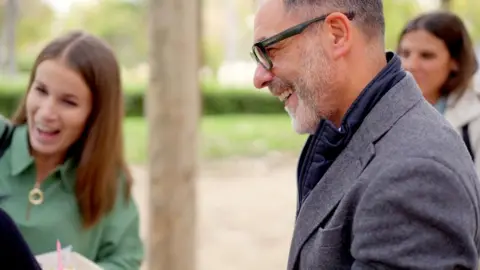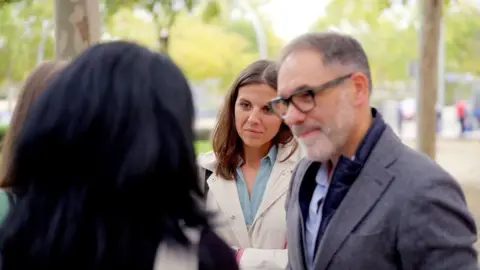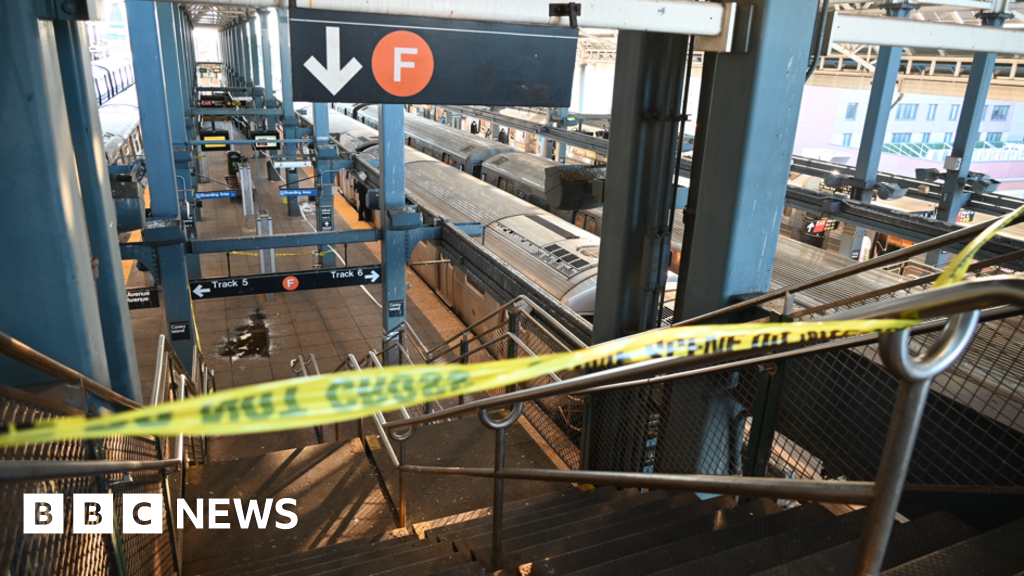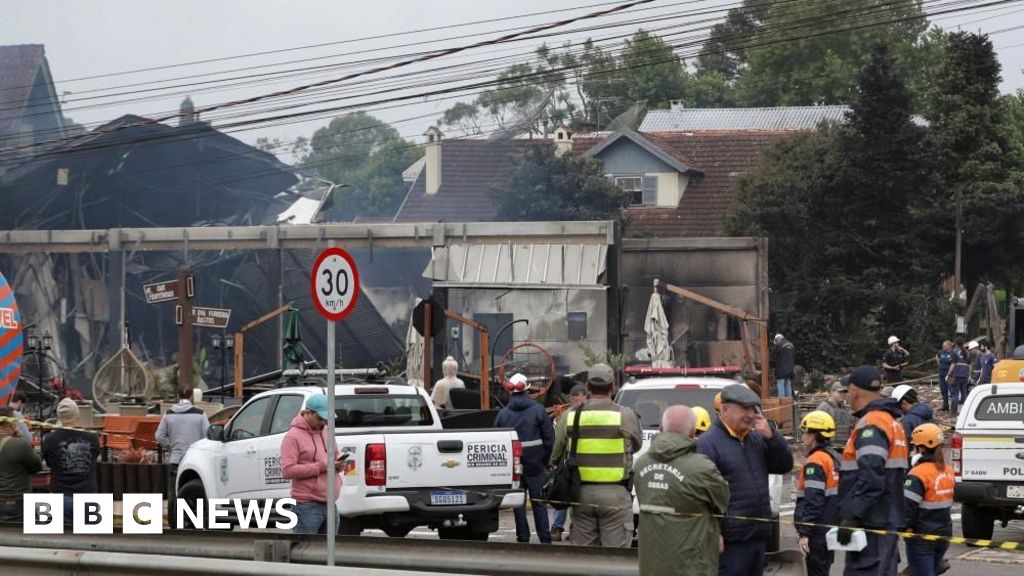
 BBC
BBC
Cristina (l) and Lidia (r) offer long-term holistic care for the sex trafficking victims they rescue
Several years have passed since Cristina and her team, an elite unit of Spanish police detectives, rescued "Victoria" from a sex trafficking ring.
When they found her, Victoria's life was hanging by a thread - for three years, she had suffered such an extreme level of physical and emotional abuse that she barely felt human. It was the hope of seeing her children again that helped her survive.
The police investigation has now ended, but the relationship with Cristina and the rest of the team hasn't. They have continued to play a substantive role in her life - from something as powerful as reuniting her with her children after years apart, to something smaller but no less meaningful: surprising her with a cake on her birthday.
It is an autumn afternoon and Victoria [not her real name] gets emotional as soon as she sees Cristina and her colleagues arrive with their present in her local park. She is smiling and glad to celebrate another year with them, but Victoria, in her 40s, says the past was "tough".


Lidia and Cristina, with their boss Felix Duran, surprise Victoria in her local park with a cake on her birthday
Her childhood in her native Colombia was brutal. Her father disappeared on his way to work one morning in 1986, leaving no trace. Her mother remarried another man who Victoria says raped her younger sister. As the eldest child, she was keen to get a job in order to rescue her siblings from hardship. When a friend introduced her to a woman who offered her a cleaning job in Spain, Victoria thought she had finally struck lucky.
But what awaited her in Europe was another kind of misery. She was immediately forced into prostitution.
"I worked 24 hours a day," she says. "I had to sleep with my make-up on and you always had to be [only] in your underwear, ready for any customer who would arrive."
We can't give details of her rescue, because as a protected witness we need to conceal her identity, but Victoria says she will never forget that sunny morning when she first saw the detectives and ran towards them.
"I looked at them, hugged them and cried," she recalls. "They offered to take me to a safe place, where I could be free without fear."
Victoria says she was so traumatised by the gang's continual surveillance that she was even asking for permission to sleep.
Since then, in partnership with other organisations, Cristina and her team have helped Victoria access psychological support, as well as advice on how to find a job and progress her studies.
More significantly, they also worked for months to help ensure the safety of her children.
The gang that lured Victoria to Spain had threatened to hurt them back home in Colombia if she ever dared to escape or alert the authorities.
They were highly organised and unlikely to be bluffing - the traffickers had texted her children directly in the past and knew where they lived and which school they went to.
Cristina and others in the Central Operative Unit - a specialised division of Spain's Guardia Civil that prosecutes the most serious forms of organised crime - worked alongside women's organisations and human rights lawyers for months to legalise Victoria's situation in Spain so that they could bring her family over to join her.
The team follows a victim-focused approach, through which women are offered long-term support to help them settle into a stable and safe environment after they have been rescued.
The team says it sometimes get teased by other units for sounding more like a "charity" than an elite team of criminal investigators, but Cristina is a passionate advocate for what they do.
"We believe in a social and humanitarian process that can restore hope in victims' lives, so they can truly recover and live passionately again."


Victoria (back to the camera) has managed to build a new life for herself with the support of the unit
While women make up fewer than 10% of Guardia Civil's officers across the board, they make up 60% of Cristina's squad. The head of the unit, Felix Duran, explains their recruitment is a "priority".
He believes that sex trafficking victims, particularly teenage girls, feel more comfortable giving details to a female officer.
Approximately 50,000 trafficking victims are detected across the world every year, the United Nations' Office on Crime and Drugs (UNODC) estimates.
Its latest global report on human trafficking, published on Wednesday, says there has been a 25% rise in the detection of victims compared with the pre-pandemic period, as "more children are exploited and forced labour cases spike".
The report finds that women and girls continue to account for the majority of victims detected worldwide, who are mostly trafficked for the purpose of sexual exploitation.
Spain is both a country of exploitation and a transit hub for thousands of victims trafficked into Europe.
Victoria and the other victims were concealed inside an apartment, surrounded by other flats. Victoria felt she was being abused in plain sight - she believes that the cries for help, the beatings, and the constant flow of men coming in and out of the property, would have made it obvious.
"The neighbours; the postman; everyone knew. They could have killed me and nobody would have asked any questions," she recalls.
After the lockdowns during the Covid-19 pandemic, human trafficking for sexual exploitation went further underground, the Guardia Civil told the BBC.
It says that, while many women are still exploited in public venues, such as bars or on the streets, most documented victims are now concealed in private apartments supplied by traffickers, making it harder for police forces to detect them.
Ilias Chatzis, chief of the UNODC Human Trafficking and Migrant Smuggling Section, says the high involvement of organised crime groups means human trafficking is now increasingly intertwined with other illegal activities, such as drug trafficking or cybercrime.
"A large number of victims remain undetected because sometimes authorities will prosecute the trafficker for some lesser offence, but not for the trafficking crime, so the victim itself would not be recognised as a trafficking victim," he told the BBC.
For Victoria, she is grateful that her own experience was recognised by the police, and wants to use it to raise the visibility of those victims still waiting to be rescued.
"They gave me another chance not only to live, but to heal and hug my children again."
She asked the BBC to be referred to as "Victoria" because it means "victory" in Spanish.
"I go out on the street and I breathe, and I say, 'my God, thank you, I'm alive'. I feel free and that's the best feeling."
Cristina says she marvels at Victoria's resilience.
"She is an example of how you can survive and overcome such an ordeal", explains Cristina. "I often think: 'My goodness, there's so much inner power, such bravery in you.'"


BBC 100 Women names 100 inspiring and influential women around the world every year. Follow BBC 100 Women on Instagram and Facebook. Join the conversation using #BBC100Women.

 1 week ago
6
1 week ago
6










 English (US) ·
English (US) ·